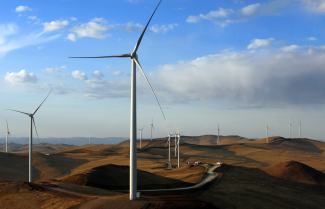Mongolia’s power sector faces numerous generation, transmission, and distribution challenges. Antiquated infrastructure, an unsustainable system of subsidies, and the dominance of coal all contribute to an inefficient and unreliable system. The dominance of coal-fired generation also contributes to Ulaanbaatar having among the worst air quality in the world. USAID promotes reform initiatives across the energy sector to improve planning and operational performance of electricity and heating systems, increase market competitiveness in the power sector (particularly to encourage more private investment in renewable energy), and enable the adoption of modern energy technologies. USAID is protecting Mongolian wildlife and natural resources from the impacts of road and railway construction by developing effective, high-quality linear infrastructure safeguards that protect people and nature from harm. USAID will also integrate, digitize, and map all available biodiversity data for current and planned infrastructure projects and create a database of barriers to wildlife migration.
PROJECTS
Asia’s Linear Infrastructure Safeguarding Nature
The Asia’s Linear Infrastructure safeGuarding Nature (ALIGN) Project aims to expand the adoption and implementation of high-quality safeguards to protect biodiversity and livelihoods. USAID designed this project in response to Asia’s rapid expansion of linear infrastructure—especially roads, railways, and power lines. Specifically, the ALIGN Project’s goal is to enhance the development and implementation of effective linear infrastructure safeguards that protect people and nature from harm. The project will focus on three objectives: policies and practices; partnerships and engagement; and capacity building around hot spots for ungulate migration corridors and snow leopard areas in Mongolia.
Asia Resilient Cities
In Mongolia, USAID’s Asia Resilient Cities (ARC) project harnesses the collective power and passion of Ulaanbaatar residents and community organizations to promote sustainable urban growth; support resilient, low-carbon urban infrastructure; and integrate climate change and environmental considerations into urban approaches. Through ARC, USAID is working with Ulaanbaatar to create a more resilient and livable environment in the face of shocks. This includes working through the steps of the USAID Resilience Conceptual Framework (absorb, adapt, transform) to overcome challenges and sustain results. Through ARC, USAID and Ulaanbaatar will achieve and sustain resilience by fostering relationships between residents, governments, and other stakeholders that will endure after the project. USAID and the Ulaanbaatar city government and municipal civic organizations will co-design activities that sustain livable environments in the face of climate change. Throughout this partnership, USAID will work with the Ulaanbaatar city government and local civil society organizations to achieve complex resilience goals, plan for more sustainable urban development, and engage people who are often excluded from urban planning.
Enhancing Production and Market Access of Vegetables
Mongolia primarily consumes imported vegetables, but recent international events such as Russia’s War in Ukraine and border closures with the People’s Republic of China during the COVID-19 pandemic have highlighted the vulnerability that this reliance on imports creates. This USAID grant will support the UN Food and Agriculture Organization (FAO) to increase and improve Mongolia’s domestic greenhouses, food storage, and distribution so that Mongolia can become more self-sufficient in vegetable production. USAID and FAO will identify policy changes for local and national governments to create an environment for private sector investment in greenhouses, and provide training on developing and managing greenhouses using modern techniques and business practices.
Mongolia Energy Governance
The Mongolia Energy Governance activity is working with the Mongolian government to increase access to reliable electricity, which facilitates sustainable and inclusive economic growth. USAID is partnering with key government and energy sector stakeholders to improve planning and operational performance, provide guidance for new infrastructure, enable greater market competitiveness and incentivize private investment through clear and transparent rules, and support increased adoption of modern clean energy technologies. Mongolia relies primarily on coal-fired power generation but has tremendous potential for greater utilization of renewable energy. This activity is assisting in that transition.

